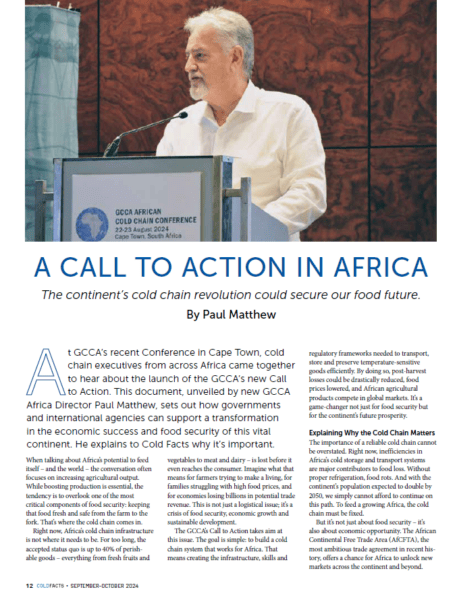From COLD FACTS Magazine (Click Image)
Read Below:
A Call to Action in Africa
The continent’s cold chain revolution could secure our food future.
By Paul Matthew
At GCCA’s recent Conference in Cape Town, cold chain executives from across Africa came together to hear about the launch of the GCCA’s new Call to Action. This document, unveiled by new GCCA Africa Director Paul Matthew, sets out how governments and international agencies can support a transformation in the economic success and food security of this vital continent. He explains to Cold Facts why it’s important.
itself – and the world – the conversation often focuses on increasing agricultural output. While boosting production is essential, the tendency is to overlook one of the most critical components of food security: keeping that food fresh and safe from the farm to the fork. That’s where the cold chain comes in.
Right now, Africa’s cold chain infrastructure is not where it needs to be. For too long, the accepted status quo is up to 40% of perishable goods – everything from fresh fruits and vegetables to meat and dairy – is lost before it even reaches the consumer. Imagine what that means for farmers trying to make a living, for families struggling with high food prices, and for economies losing billions in potential trade revenue. This is not just a logistical issue; it’s a crisis of food security, economic growth and sustainable development.
The GCCA’s Call to Action takes aim at this issue. The goal is simple: to build a cold chain system that works for Africa. That means creating the infrastructure, skills and regulatory frameworks needed to transport, store and preserve temperature-sensitive goods efficiently. By doing so, post-harvest losses could be drastically reduced, food prices lowered, and African agricultural products compete in global markets. It’s a game-changer not just for food security but for the continent’s future prosperity.
Explaining Why the Cold Chain Matters
The importance of a reliable cold chain cannot be overstated. Right now, inefficiencies in Africa’s cold storage and transport systems are major contributors to food loss. Without proper refrigeration, food rots. And with the continent’s population expected to double by 2050, we simply cannot afford to continue on this path. To feed a growing Africa, the cold chain must be fixed.
But it’s not just about food security – it’s also about economic opportunity. The African Continental Free Trade Area (AfCFTA), the most ambitious trade agreement in recent history, offers a chance for Africa to unlock new markets across the continent and beyond.
However, to make this a reality, there must be infrastructure to support it. Better cold chain systems would enable farmers to export their products to neighboring countries, reducing reliance on imports and creating jobs across the food value chain.
The AfCFTA provides the framework; now the cold chain needs to bring it to life.
A Vision for Change
The GCCA’s Call to Action sets out a bold vision for transforming Africa’s cold chain. The first step is investment – in cold storage facilities, refrigerated transport and the energy infrastructure needed to power them. And given Africa’s often unreliable electricity supply, this means looking at renewable energy solutions like solar-powered cold storage. Africa is uniquely positioned to harness clean energy to power its cold chain revolution.
We also need to build the local expertise to manage and maintain this infrastructure. Too often, Africa has relied on foreign contractors to build critical systems, only to see those systems falter when the contractors leave. We must invest in training a local workforce skilled in cold chain logistics, refrigeration technologies and supply chain management. This isn’t just about keeping the lights on – this is about African ownership and sustainability.
Partnering With Policy Makers
Of course, none of this can happen without the right policy environment. Governments must prioritize cold chain development in their agricultural and trade policies. This means offering incentives for private sector investment, simplifying cross-border regulations and subsidizing the cost of cold storage for smallholder farmers.
Africa’s policymakers must also think creatively about financing – whether it’s through public-private partnerships or leveraging international development funds to bridge the gap.
The Stakes Are High
The cold chain in Africa is at a critical juncture. Africa has the resources, the land and the people to be a global agricultural powerhouse. But without the ability to preserve and transport its food, much of that potential literally will go to waste. A functioning cold chain could reduce food loss, improve food safety and ensure African farmers can access markets both at home and abroad.
The transformation of Africa’s cold chain is not a luxury – it’s a necessity. If we are serious about feeding our people, growing our economies and tackling the challenges of climate change, then we must act now.
The Call to Action is our roadmap, and we will be sharing with governments and other decisionmakers across Africa in the months and years ahead.
Read the full Call to Action at www.gcca.org/africa

